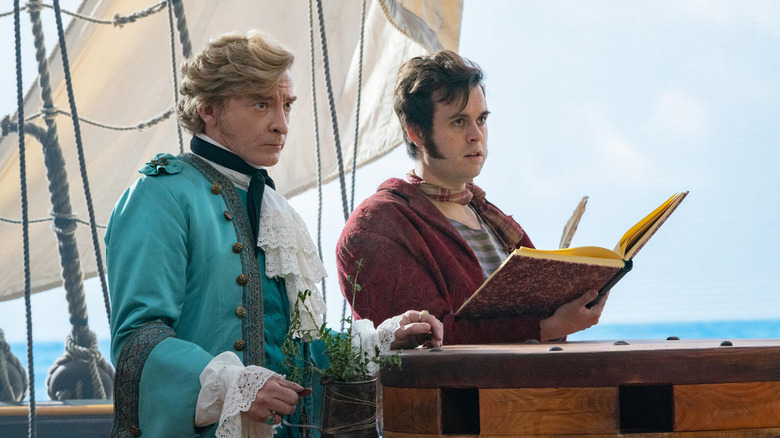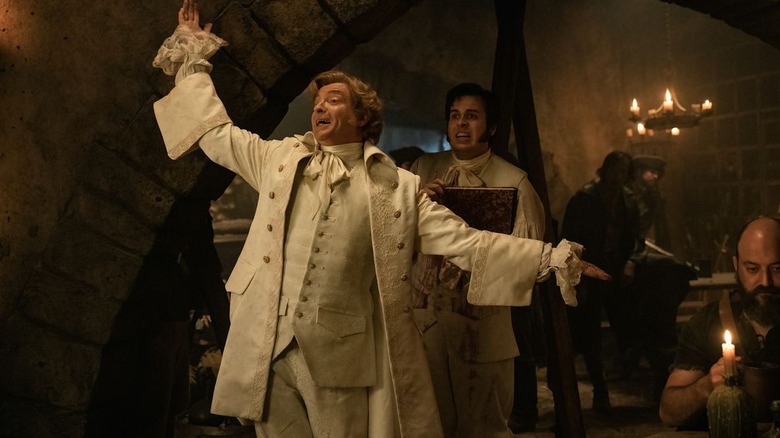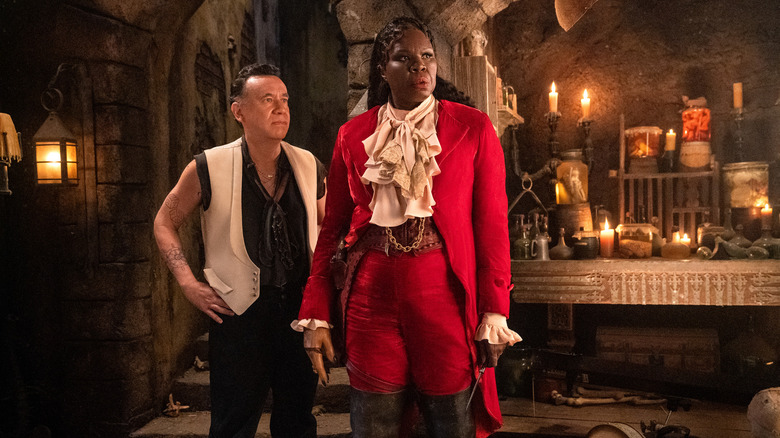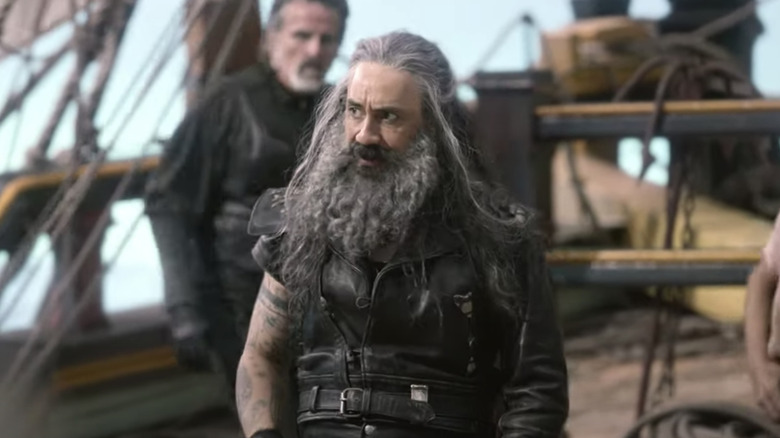Our Flag Means Death Creator David Jenkins On The Freedom Of Not Doing Research [Interview]
"Our Flag Means Death" isn't about the thrills of the pirate's life on the high seas. The underdog story is more about the moments in between the action, with a band of pirates trying to keep the ship and each other's spirits afloat. Creator David Jenkins' ("People of Earth") workplace comedy finds the hilarity in the mundane, not the adventure.
Above all else, it's the story of a very charming anti-hero, Stede Bonnet (Rhys Darby). Based on a real figure from history, Bonnet flees from his wife and kids to live out his dream as a pirate. For Jenkins, the facts from history sort of stop there. As actor, producer, and director Taika Waititi advised the creator, "Don't do any research on this thing." During an interview, Jenkins told us about that lack of research, his collaboration with Waititi, and how they came up with a poor man's version of "The Mandalorian."
'I don't feel like I've met Rhys'
For Rhys Darby's character and Blackbeard (Waititi), how did the idea of the midlife crisis for these pirates come about?
Well, that was what happened with the real guy, the real Stede Bonnet, who had a midlife crisis and decided to become a pirate. We don't know much about why. If you go to the Wikipedia page, there's not a lot there. So, to fill in the blanks and try to figure out why this person did this, well, he was uncomfortable "in a married state," that was his quote. He said that his wife, Mary, nagged him. You're just like, "Oh, come on, man. What happened? How did you f*** this up? What did you do?" And he did something like he left his family to go do something insane, to live this life of crime. Those are just the facts. Those are the facts you're starting with of his story.
So, already, it's a wonderful true crime story. I think it has to be central to us watching this guy and being like, "What is he searching for? What even is he looking for?" So, that pretty quickly was like, "Oh yeah, this is a good engine."
What Stede does is terrible, but it's kind of amazing how much Rhys still makes you like him through sheer charm.
That was precisely the calculus in casting Rhys. We'd written the majority of the season before I thought of Rhys. I think we got one round of auditions and very quickly it was like, "Oh," like really, really talented actors auditioned for the part. I was like, "Oh no, I hate this guy. I hate the lines coming out of all of their mouths because he's a hard guy to like." I think Rhys is the only person who could play it. He's the only person who has that combination of things where he did something really bad, but there's a childlike quality to him where you kind of give him a pass. You're like, "Oh, he's in crisis, but I can get behind this guy." If it's Rhys, I mean, there's a kind of pluckiness to him and there's a kindness to him that makes up for a lot.
When he got cast, knowing his voice and how he can deliver a line, how'd that change how you wrote the character?
I mean, the voice, it changed everything immediately. You get an actor and you're playing the part when you're writing it. It's not cast. You're performing all the parts and you have your version of it. But then when it's Rhys and you start imagining like, "What is he going to do?" And like, [does a perfect Rhys Darby impersonation] "Oh, come on, everyone." And it's like, this is great. You can do so many things with this. He's a benign narcissist, this character, but he's a narcissist. Somehow, for both Stede and Blackbeard, hearing it in a New Zealand accent to me somehow cracked both of those parts open.
How long did it take you to get your Rhys Darby impersonation to that level?
It's been a work-in-progress. I've been tormenting my writers' room with it for a long time.
It's very good.
Thank you. It helps me. It's like HTML where there's a preview and you get to see with it. It's a little bit like that, where it's like, "Okay, let me just imagine how he'd say it."
Rhys Darby is one of those actors that makes it look effortless, but I can't imagine the incredible amount of work involved to be that funny.
Dude, he works. I know, he seems so effortless. On the set, he went through what number one on the call sheet goes through in a drama. I don't feel like I've met Rhys. I met Rhys once. I feel like just in talking to him and when we were getting started and everything, but the rest of the time, I was working with Stede. He's a hard-working guy. I mean, he was in the military in New Zealand and he's just got this work ethic that he really did it. I was very impressed with the level of concentration and focus he put into this.
Is he method?
I mean, I don't even know what that term means anymore. It's just so removed from what that meant in the 1930s. I think to watch him, he did the thing that happens when you're an actor and you're playing a serious part where your body doesn't know it's not real. Your brain knows it's not real, but if you're doing it, you're actually feeling the sh*t even though you're doing a comedy version of it. There were days where it's like, "Man, he's worn out. This is f***ing him up." He really went through it for this. I think when it's a comedy, people are like, "Oh, they probably just goofed around and made up the scripts." This show is rigorous, man. I mean, the amount of rigor that goes into the scripts, but then the amount of rigor that the actors bring to it to get to the emotional moments. I'm so impressed with Rhys as an actor. I think he's incredible.
'We came up with a poor man's version of 'The Mandalorian''
How has your HBO Max experience been? How are they as collaborators?
Dude, it was a dream. It is a dream. It is the best. It was the opposite of every other production experience I've had. They were game. They were behind the show a hundred percent. They gave us everything we wanted and then some. They were hands-off enough but still there when you needed support. I can't speak more highly of the development process of the show.
I think they were thrilled to have it. They were thrilled to see the first script and see how well it worked and then they were just in. And then we had to be like, "Hey, you write a pirate show, but then you actually have to make the pirate show." And you're like, "Oh, they're on water the whole time. Oh. How are we going to shoot this?" We came up with a poor man's version of "The Mandalorian," where we had this giant LED screen around the ship and they just went with it. I expected them to be like, "No, we can't do that." I think it turned out really well. So, yeah, I had a really, really good experience working with them. I think they're great.
What were some of the real challenges in the writers' room?
It's a big, creaky genre. It's pirates and it's just it's been done a million times — well, it's been done well a lot. The big creative journey from the scripts through to production design is just, how do you budge this giant stubborn genre and try to add something to it when so many people have done it so well? How do you subvert it while still being true to it? That's the big puzzle and why I love to work with genre, but it's also pirate things all kind of lookalike. It's damp wood and white shirts. To break it out of that vernacular even a tiny bit, you really have to throw a lot at it, a lot of creative attention. You just need a lot of creative minds who are game to do that.
For the episode "The Best Revenge Is Dressing Well," did you and Taika ever talk about "Barry Lyndon" or "Marie Antoinette?"
I talked about "Barry Lyndon" quite a bit with our DP and visually what this was going to look like. We talked about that quite a bit and we have an amazing production designer in Rob Vincent, who did "Jojo Rabbit" and "What We Do In The Shadows," the movie and the show. Christine Wada ("Loki"), the costume designer, did an amazing job. Just the hair and makeup for that episode, Nancy Vincent ("The Lord of the Rings"), Rob's wife, did the hair and makeup, that was incredible.
I didn't want a comedy look where sometimes it's like, "Oh, you're doing a comedy. Well, bright, bright, and we can shoot it like an SNL skit." And to actually reference a Kubrick movie or a Spielberg movie or any given thing for it, but for that episode, it was definitely "Barry Lyndon." We tried to get some level of beauty in a comedy show, which usually hurts comedy in my mind. I think in this world, I think it works.
Why do you think beauty can hurt comedy?
If it's too beautiful sometimes, it's not shaggy enough. What's so great about Paul Thomas Anderson, his movies have a shagginess to them, it's kind of a looseness where it's like anything can happen. When I see something that's too groomed, it's a little stiff. I don't know, this is very well-produced, so I think mixing really beautiful visuals in comedy, for my money, I want to see "24-Hour Party People" or something that feels documentary-style or just a little more immediate, loose. Trying to do that with a show that's a period thing where you have to do all this prep, you're constantly trying to find that balance.
'This is why I don't have a tattoo'
How does working with Taika, the actor, compare to working with Taika, the director?
Yeah, that was something I didn't know how that was going to go, because you have visiting directors working with a phenomenal director as an actor. I think he came in, he's just game. He's the dream collaborator as an EP, where I think he came from a very complicated movie in doing "Thor" and had a week to hit the ground and get going on this. So, I had prepped everything for him and made a lot of big choices and he just rolled with everything. He's not showing up and tearing stuff down or like, "We can't do this," so in that way, it's fantastic. If you have big ideas that are very clear, he's in.
So, as a director, he'd just take those and then he'd make them better. There are a couple of things he'd basically shot my first draft of the scripts, but then he threw in the bit where there are amenities on the ship and they're playing tennis and there's a ballroom. And so, he just improvised that, which, to improvise that as a director, that's a lot. You've got to move lights, build this stuff. He did that on the fly.
Then as an actor, he's like the actor that I think he probably wants to have as a director. He shows up. He knows his stuff. He's committed to the scene. He gives you what you want. If you give him a little adjustment, he's just like, "Oh yeah, cool." And then he does that. He's just a joy. He's a total joy to make something with. Just game to show up and try to give you the best version of what you've created.
How much did you guys dig into the history of Blackbeard?
Not much. We didn't do a lot of research on this. Very quickly, we were talking about it and he was like, "Oh yeah, man. Don't do any research on this thing." I had just gotten done writing something where I had to do a lot of research, because it was with people that were still alive, I didn't want to get sued. So with this, it was like, "Oh yeah, no, let's not kill this with research." Once you have a Polynesian Jewish man playing Edward Teach as Blackbeard, you're already not in reality. So, then you just get to invent and then when we get stuck, then you can go back and be like, "What actually happens?" And then there would be like a story beat or something like, "Oh yeah, cool. Let's do that."
The rare moments of bloodshed really pop on this show. How bloody did you want to go?
It starts very much as a workplace comedy, and to me, when you think of it as a workplace comedy, it's just like Tuesday on a pirate ship and big dumb, blue sky and flat ocean and this is your job. The comedy is there, but then you break it up. When there's violence, it has to be real violence because they live in a Hobbesian world, essentially, where there's no social contract and life is cheap. On this show, when we did violence, I really wanted it to be violent. I want you to be like, "Oh, he really got stabbed." To have those stakes, I think, makes Stede much more counterculture, where he's doing this weird thing on his ship, where he's paying people a salary. He's very modern in his views of what a workplace should be, in the middle of Hieronymus Bosch painting or something. That's what makes him special. I think what makes me love that character.
How many seasons do you hope to do for "Our Flag Means Death?"
I don't know. This is why I don't have a tattoo. I change my mind too much. You just, you don't know. I mean, I know people say, "Oh, I've got five years of show planned." No, you don't. It's going to change. If your idea of what happens in the show doesn't change two years in, it's hard to write these things. You change as a person. What you understand about the characters changes. Right now, I think maybe you could do this in three years. If we were lucky enough to get three seasons and tell a really good story, great. At a certain point, in a year, I could be like, "Oh no, there's a whole other thing." But right now, it feels like you could do it in three.
The first three episodes of "Our Flag Means Death" are currently streaming on HBO Max.



